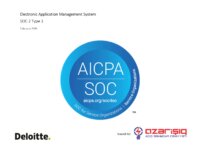“Azerishiq” OJSC has created an innovative and enhanced e-service for providing electricity of up to 150 kilowatts to the existing or under-construction buildings of entrepreneurs. As a result of these reforms, entrepreneurs will be able to apply for an electricity connection through the One Window system online by visiting https://www.e-gov.az/en/login/?return=/az/services/readwidenew/3774/ website and the entrepreneur’s business will be provided with electricity within 20 days.
Innovation Tag: Open Government
We often hear stories about the interpretations of laws and attitudes of public institutions. This year in Latvia for the first time the initiative “An Official Shadows an Entrepreneur” was launched, allowing for the public servant to broaden his view and “step into entrepreneur's shoes” to evaluate how the regulation is applied in practice and what requires further improvements. The initiative promotes a dialogue between the state and the business to reduce the administrative burden.
The Digital Court File is an everyday tool for judges, court staff, lawyers and parties to a proceeding that will replace the paper-based court file entirely. It links hundreds of pages of court files into a single view, and all participants in the proceedings can access the documents electronically. The Digital File can also be used as a tool to make cross-references, add notes and comments, search by keyword, filter documents and export them to your computer.
The Ministry of Possibilities is a virtual ministry created to incubate and solve the systemic impossibilities of government.
It works by creating time-bound departments experimenting together to ask impossible questions and disrupt the conventional systems with leapfrog solutions that are yet to be explored
Its focus areas & mandate are:
To IDENTIFY impossibilities
To INCUBATE virtual, timebound departments/teams to solve and explore the impossibilities
To EDUCATE and train on the mindset of…
Learning Together for Better Public Engagement (Learn4PE) was a pilot initiative designed to build public engagement capacity across the Government of Canada. In its first iteration, participants spent five weeks learning together in English and French, both online and by participating in live sessions with experts. While targeted towards federal public servants, registration was open to all, enabling the exchange of relevant ideas and resources.
Informed Participation is a unique way to bring the public into government decision making. It gives government a method to solve complex issues with the public in a way that gives them a meaningful role in balancing competing interests. Public policy is becoming increasingly complex and trust in government is declining, so new innovative ways of engaging with citizens is needed. This method shifts engagement from obtaining buy-in to building ownership and creates more legitimate solutions.
The GovTech Lab is a public sector team focused on encouraging the creation and use of innovative solutions for the government. The GovTech Lab helps the public sector identify challenges that can be solved with emerging technologies, engages startups and SMEs, creating innovative solutions and accelerating startups in #GovTech and #TechForGood space.
In order to set a common understanding of the progress made on the Government action plan related to Open Government, an online platform publicly shares the details of every government commitment and its corresponding progress. This approach offers:
- A framework for coordination between the different administration entities around Open Government
- A tool for transparency and accountability to be used by civil society and the general public
Case Study
Libellula – a civic monitoring lab and a format to build and sustain a local civic monitoring…
Libellula is a laboratory for civic monitoring of local public spending and a format to build and sustain a local civic monitoring coalition. The first lab is based in Messina, Sicily. Moving from monitoring a specific case, Libellula aims at building a civic multi-stakeholder coalition which, while monitoring, simultaneously cultivates skills and capabilities of those involved to advocate for transparent and collaborative public spending in order to address the misuse of public money.
GovTech Poland has developed world's first challenge based procurement model where the authors of the best idea receive a full implementation contract without the need for an additional cumbersome tender. With the goal of opening procurement to all creative individuals, the model covers the process from identification to implementation. A pilot run, tested in both central and local institutions has increased SME participation in procurement processes by an average of 1600% (in a sample of 250)…




